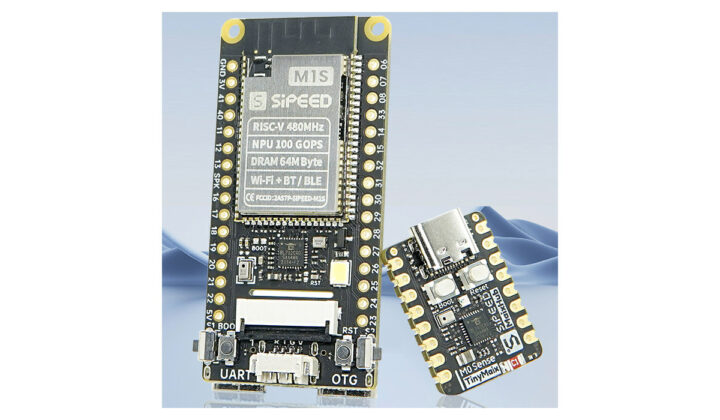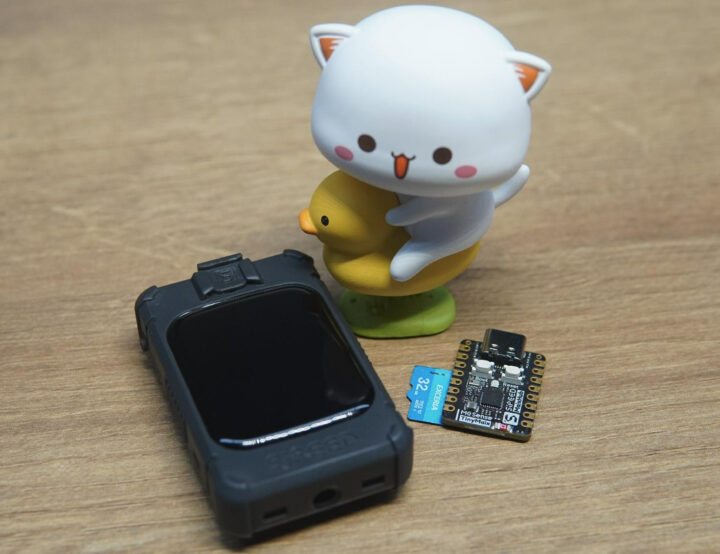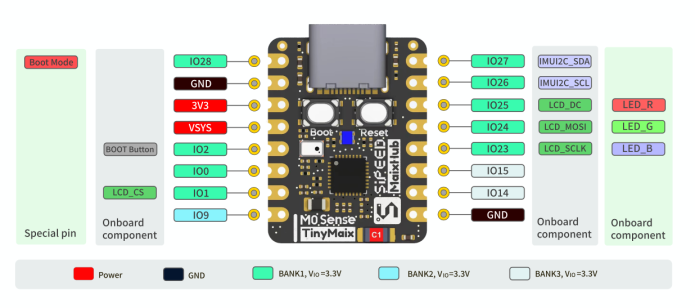Sipeed has launched the M1s and M0Sense AI modules. Designed for AIoT application, the Sipeed M1s is based on the Bouffalo Lab BL808 32-bit/64-bit RISC-V wireless SoC with WiFi, Bluetooth, and an 802.15.4 radio for Zigbee support, as well as the BLAI-100 (Bouffalo Lab AI engine) NPU for video/audio detection and/or recognition. The Sipeed M0Sense targets TinyML applications with the Bouffa Lab BL702 32-bit microcontroller also offering WiFi, BLE, and Zigbee connectivity.
Sipeed M1s AIoT module
The Sipeed M1S is an update to the Kendryte K210-powered Sipeed M1 introduced several years ago.
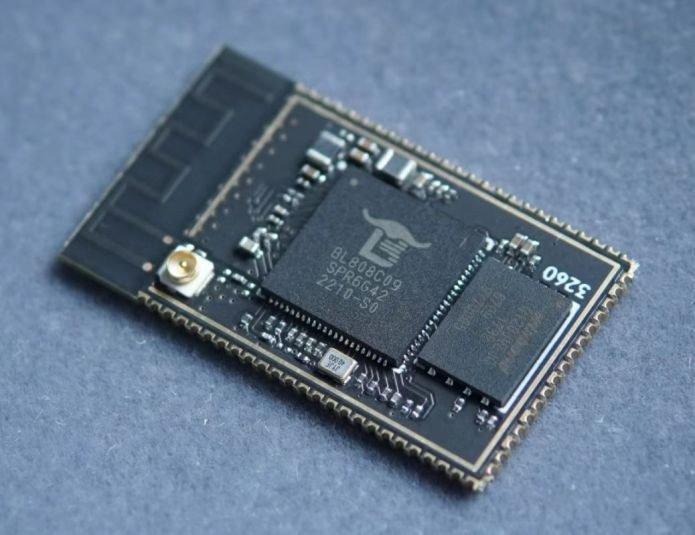
Sipeed M1s module specifications:
- SoC – Bouffalo Lab BL808 with
- CPU
- Alibaba T-head C906 64-bit RISC-V (RV64GCV+) core @ 480MHz
- Alibaba T-head E907 32-bit RISC-V (RV32GCP+) core @ 320MHz
- 32-bit RISC-V (RV32EMC) core @ 160 MHz
- Memory – 768KB SRAM and 64MB embedded PSRAM
- AI accelerator – NPU BLAI-100 (Bouffalo Lab AI engine) for video/audio detection/recognition delivering up to 100 GOPS with “rich OPS”
- VPU – H.264 up to 1920×1080
- Wireless
- 2.4 GHz 802.11 b/g/n Wi-Fi 4
- Bluetooth 5.x dual mode (classic + BLE)
- IEEE 802.15.4 for Zigbee
- CPU
- Storage – 128Mbit (16MB) NOR flash
- Castellated holes with
- Display I/F – SPI, 8-bit MCU, RGB LCD
- Camera I/F – MIPI CSI and DVP interfaces up to 1080p
- Audio – I2S and analog audio input/output
- Networking – RMII Ethernet
- USB – USB 2.0 OTG HS
- Low-speed peripherals – UART, I2C, SPI, SDIO, ADC/DAC
- Dimensions – 31 x 18 mm
They seem to have considered the ESP32-S3, but the BL808 module provided more processing power and RAM. The table below shows the comparison between Sipeed M1, M1S and ESP32-S3-WROOM-1-N16R8 modules. I’m just not sure why they seem to imply the ESP32-S3 does not support AI acceleration, since it does.
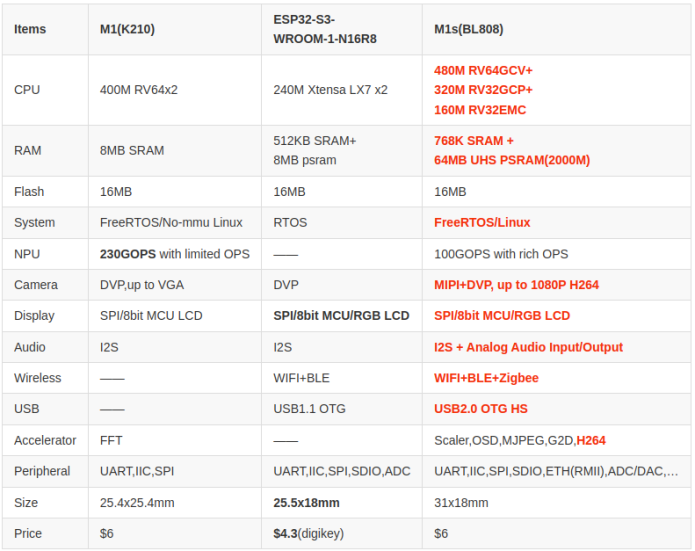
One advantage of the BL808 is that it can support Linux, and the microcontroller does include an MMU, so you would not have to deal with the usual uClinux headaches.
Sipeed also offers the Sipeed M1s Dock with a camera and display to demonstrate most functions from the M1s module.
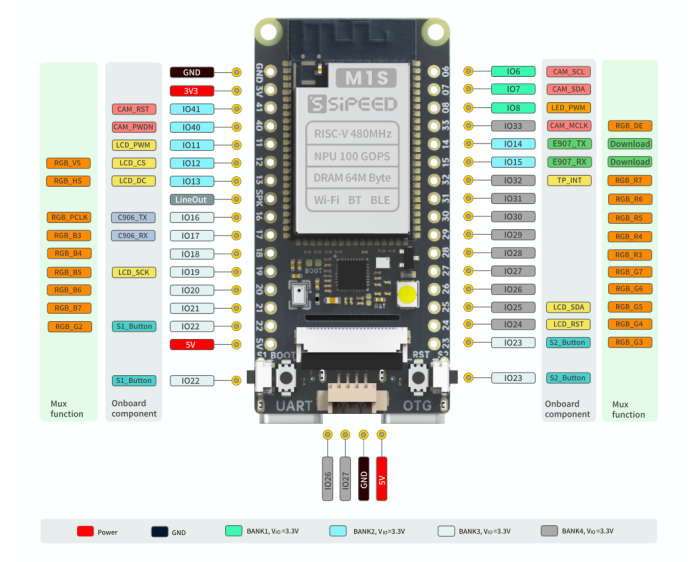
Sipeed M1s Dock specifications:
- Module – Sipeed M1s described above
- Storage – MicroSD card socket also supporting JTAG mode
- Display – 1.69-inch 280×240 display with a capacitive touchscreen
- Camera – 2MP MIPI CSI camera with LED flash (OV2685 sensor)
- Audio – Analog MEMS microphone and Line Out
- USB – 1x USB Type-C to dual serial port, 1x USB 2.0 Type-C OTG HS port
- Expansion
- 2x 16-pin header for I/Os, breadboard-friendly
- 4-pin UART connector
- Debugging – optional TF2JTAG
- Misc – Reset, Boot, and 2x user buttons
- Power Supply – 5V via USB Type-C port
- Dimensions – 55×27 mm
The company also offered an enclosure for the Sipeed M1s Dock as shown above with a microSD card and the Sipeed M0Sense used for scale.
Sipeed M0Sense TinyML board
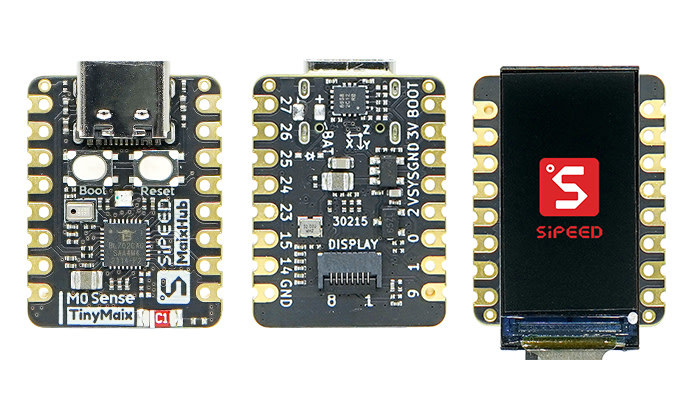 Sipeed M0Sense specifications:
Sipeed M0Sense specifications:
- Microcontroller – Bouffalo Lab BL702 32-bit RISC-V (RV32) microcontroller @ 144 MHz with 132 KB SRAM, 512 KB flash, Bluetooth LE connectivity
- Display – Optional 0.96-inch display
- USB – USB Type-C port
- Sensor – IMU and microphone
- Expansion – 2x 8-pin header (through and castellated holes) with GPIO, I2C, UART, SPI
- Misc – RGB LED
- Power Supply – 5V via USB-C port
- Dimensions – 23 x 18 mm
Software support
There are multiple ways to program the boards from drag and drop apps as both the M1s Dock and M0Sense can be seen as mass storage devices, to a lightweight python script, and a more complete and flexible SDK with samples available on GitHub.
Sipeed also offers two AIoT/TinyML solutions that work on the new modules/boards and a range of third-party boards:
- TinyMaix – A Tiny inference Neural Network library specifically designed for MCUs with just 400 lines of core code and ported to 40+ chips so far
- MaixHub – An Online AI model training & sharing platform
The best way to understand the capabilities of the Sipeed M1s and M0Sense is to watch the video below showcasing various demos from MNIST handwritten digit recognition to face detection, posture recognition, object classifications, and more.
Pricing and availability
Sipeed has launched the M1S and M0Sense on Indiegogo with a $2155 US flexible funding target. Rewards start at $19 for a pack of five M0Sense boards and $22 for a complete Sipeed M1S Dock kit with a display, camera, and enclosure. Shipping adds $2 to $29 depending on the destination country and is scheduled to start at the end of the month right after the campaign is complete in about 15 days. Alternatively, you can purchase the boards on the company’s Aliexpress store.

Jean-Luc started CNX Software in 2010 as a part-time endeavor, before quitting his job as a software engineering manager, and starting to write daily news, and reviews full time later in 2011.
Support CNX Software! Donate via cryptocurrencies, become a Patron on Patreon, or purchase goods on Amazon or Aliexpress


